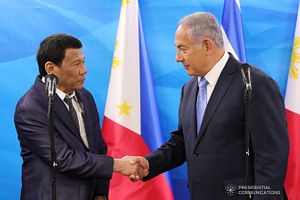Last week, Israel’s defense attaché to the Philippines held a meeting with the Philippine army chief. While they both discussed a range of issues, the conversation also spotlighted what could lie ahead for the counterterrorism aspect of defense collaboration between the two countries, which has been a point of focus in recent years.
As I have noted before, despite concerns in bilateral ties on some fronts including Philippine President Rodrigo Duterte’s drug war and some of his perceived anti-Semitic remarks, the Philippines and Israel have nonetheless been making inroads in the defense realm. That trend fits with both Duterte’s efforts to diversify foreign relations with a number of countries for Manila’s security needs and Tel Aviv’s desire to make inroads in defense-related areas with key Asian states.
One aspect of this has been the collaboration both countries have been pursuing in counterterrorism. which is no surprise given the fact that both countries have the threat of terrorism posed by Islamic State-linked groups at the top of their list of security priorities. While actual cooperation had been slow to take shape, some signs of this have been visible over the past year or so, including some training for Philippine police in Israel as well as discussions in other aspects such as consultations, exercises, and equipment transfers.
Last week, we saw a spotlight on this aspect of collaboration again when Israel’s defense attaché to the Philippines, Shimon Edri, held a round of scheduled consultations with Philippine Army (PA) Commander Gilbert Gapay on January 22.
Per the account of the meeting by the Philippines News Agency, the meeting saw the two discuss a range of issues, including the plans of both armies and ongoing efforts to build up their capabilities. But the issue of counterterrorism also came up, with both sides vowing to boost cooperation in curbing terrorism and discussing areas of future collaboration. Per PNA, both sides discussed longer training periods for Philippine personnel, coming up with an army-to-army working group to further collaboration, relevant PA equipment acquisition and transfer for utilization in capacity-building, and Israeli personnel that would be involved in training programs.
Gapay offered praise for this aspect of collaboration more generally, noting that “prospects are very bright for our army-to-army cooperation” and that the service was committed to investing in such activities. As we see Israel-Philippines defense cooperation continuing to take shape for the rest of 2020 and beyond, it will be important to assess how exactly these characterizations are translating into reality.

































